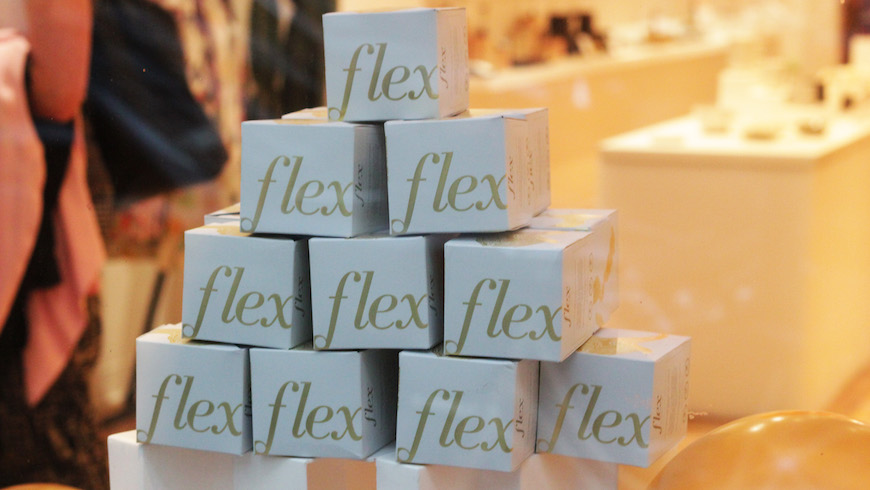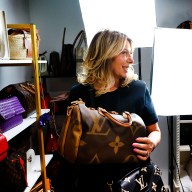If you walk down Wooster Street in Soho in the next few weeks, you might pass a sidewalk sign that reads “On your period? Come inside.”
The sign sits in front of the boutique Bulletin, a retail startup that stocks digital brands in a brick and mortar store. The current window display consists of stacked demi boxes printed with the word “flex” printed in gold lettering. “Have the most comfortable period of your life,” and the URL — in all-caps, as though you’re screaming it — IHATETAMPONS.COM, is etched onto the glass window above.
Yes, IHATETAMPONS.COM is an actual site — it’s the URL for The Flex Company, which sells disposable menstrual discs online. From now through June 30, it’s hosting a pop-up at Bulletin, where you can shop for the elegantly packaged period products alongside other e-commerce purveyors of apparel and lifestyle items, from bathing suits to essential oils. Pretty different from trudging down the aisles of your local Duane Reade and schlepping a box of Tampax, in glaring blue and yellow, to the counter, where, more likely than not, you, the cashier, or someone behind you in line will feel uncomfortable about the whole experience.
Flex is the latest entry in a wave of menstrual-product innovation, which includes “period underwear” Thinx, Go Commando yoga pants by Dear Kate and breathable “oxygen-release pads” To2M.
“This is a test for us,” explains The Flex Company co-founder Lauren Schulte. “First and foremost, it’s around creating a conversation and getting periods out in the forefront — like on the street in Soho. That’s the mission for us: to create life-changing body-positive experiences through the products that we make and the conversations that we spark.”
The 31-year-old founded Flex in 2015 after suffering from yeast infections “from the time I got my period through my late twenties,” she says. The culprit? Tampons. “I learned that cotton itself is disruptive to the pH balance of the vagina,” she explains. “Since it’s organic material in a warm, dark, moist environment, it’s the perfect place for bacteria to grow.”
Schulte tried over 30 period products, including the most well-known reusable menstrual cup, the DivaCup. While Schulte is an advocate for safe and effective menstrual devices — the more available on the market, the better, she believes — she found most of the current options bulky and uncomfortable.
The LA-based marketing pro, who has worked with brands including Coca-Cola and UpWork, knew there was room for a middle ground between tampons and pads and reusable cups. (The Flex differs from a disposable menstrual cup, such as SoftCup, in its shape and placement). She and her co-founder, Erika Jensen, former director of e-commerce for the high-end sex toy company Jimmyjane, came up with Flex.
Here’s how it works. The disposable, single-use discs, which you can wear up to twelve hours, are made of FDA-approved, medical-grade polymer, which Schulte explains is a “body-safe plastic” that’s proven safe and effective in medical devices. Plus, “it’s an inert material, which means bacteria cannot grow in it,” she notes. It’s BPA- and phthalate-free, without silicone and latex (common allergens). The material “uses your body heat to warm up to form your natural shape, creating a leak-free seal,” the brand explains on its site.
It rests in the vaginal fornix, located at the base of the cervix, where a diaphragm goes, as opposed to sitting inside the vaginal canal like a tampon or menstrual cup. Schulte says that, coupled with the fact that it’s soft and collapsible, makes it more comfortable, with an added bonus: you can have less messy sex while you’re wearing it. While you can wear it with an IUD, Schulte advises women first consult with their doctor, because it’s possible the IUD strings could be disrupted during insertion or removal of the Flex.
Why create a disposable product? “Changing human behavior is the most difficult thing,” Schulte says. “To me, I think that Flex is a step in-between a completely reusable product and classic applicator tampons, which the majority of American women use.” During the testing phase of Flex, Schulte gave women reusable prototypes, and while they said they loved the idea, when she checked back months later, the majority had discontinued them. She considers Flex a “stepping stone” for women to start on, and then “we can move women in the direction” of reusable.
While Schulte envisions a future where Flex is stocked in drugstore and retailers nationwide, she says there’s still a ways to go. “This product requires a lot of education. If it’s static on a retail shelf, you’re like, ‘what is it?’ Using an internal device for the first time as a grown woman is pretty terrifying,” she says. (Remember putting in a tampon for the first time?)
The ultimate goal is to remove the cultural taboo and shame around menstruation and to increase education and conversation. “I think with women’s products in general, we’re told, ‘do this,’ or ‘don’t do that,’” she says. “It’s women to women too, the shaming — ‘why do you use this, why don’t you use that? I do this, this is better.’ Let’s have a conversation and be educated about what we choose.”
Visit the Flex pop-up now at Bulletin on 138 Wooster, through June 30, where an 8-pack of Flex retails for $20. Visit Flex online at ihatetampons.com.
















